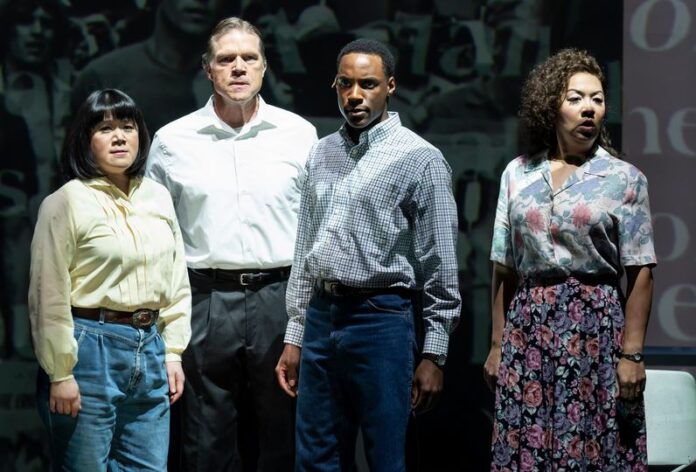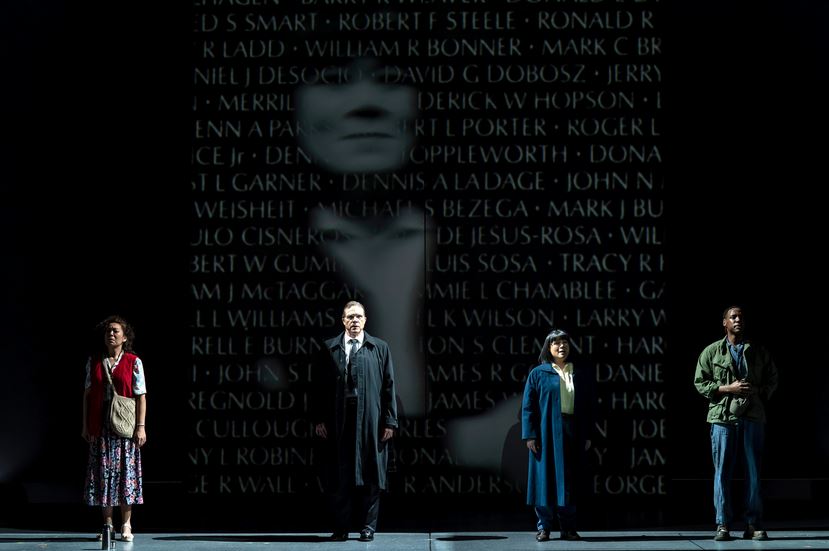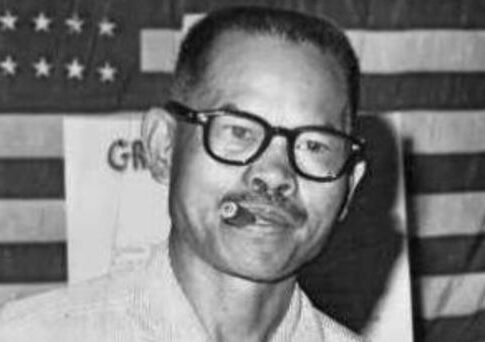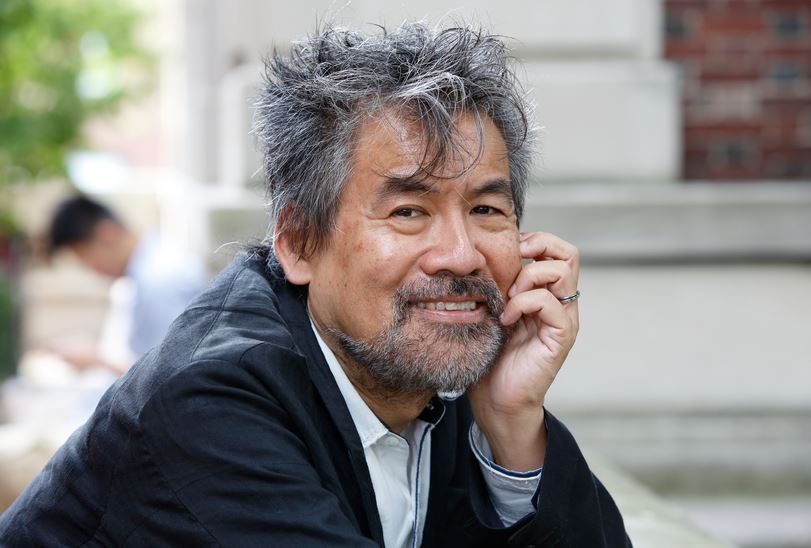By Jessica Xiao, AsAmNews Contributor
David Henry Huang’s latest work The Rift presented by the Washington National Opera premieres tonight, running from March 5-25. This short operatic work, with the libretto by Hwang and music composed by his long-time collaborator Huang Ruo, is one of four works commissioned from different artists that comprise Written in Stone, prepared in celebration of the Kennedy Center’s 50th anniversary.
The Rift explores the controversy surrounding the Vietnam War Memorial, featuring four main characters – Maya Lin (who won the competition to design the memorial) as she faces questions of her “Americanness,” Robert McNamara (who escalated the U.S.’s involvement in the war as Secretary of Defense), a Black American Vietnam War veteran, and a Vietnamese refugee whose husband died fighting in Vietnam but whose name would not appear on the memorial (which only lists U.S. citizens who perished during the war).
Hwang was drawn to the story of the Vietnam Memorial because it is a story of today.
“It tells of a time in American history where the country was incredibly polarized and it was a very divisive period. Unless you’re of a certain age and were around during that period, that kind of divisiveness, you’re not necessarily aware that the divisiveness that we feel in America now is not new, that it has existed before.”
LATEST STORIES
Not only is The Rift a historical work, but centers on how anti-Asian racism manifested in the aftermath of the Vietnam War. (He even reminded Huang Ruo of its relevance, when Ruo was uninspired to finish the work, amidst the pandemic and given the rise in anti-Asian hate incidents.) “All of the divisions about the war itself got projected onto people’s views about the design and at the center of it was a 22-year-old recent Yale graduate, Lin, whose design was attacked, but she was also attacked as a young Asian woman.”
While writing the libretto, he consulted her.
“I wrote her to get her permission and she sent me some background materials that hadn’t been published that were about her experience going through it.” They had crossed paths in their early 20s, around the time of her winning bid, and remained friends throughout the years, reconnecting in the 1990s when they both served on the board of the Museum of Chinese Americans in New York City. (According to Hwang, She hasn’t read the libretto yet, but intends to see the opera.)
Ultimately, it has a hopeful message. “[Y]ou fast forward a few decades and the Vietnam Memorial is arguably the most popular memorial in the country – certainly the most popular, most visited memorial in Washington, DC. It’s a story about how a work of art can help to heal a country.”
Hwang grew up during the Vietnam War and remembers its impact on the United States and on the perpetual foreigner syndrome that Asian Americans face. He wrote about it in the largely self-autobiographical musical Soft Power.
“In Soft Power, there is a speech about, ‘oh, when I was a kid, America had been at war with Japan, Korea, Vietnam– and China was the big enemy.’ So to the extent that conflict between America and Asian nations gets played out in this country on Asian American bodies, then I grew up in a period when all of the enemies in the past 20 years looked like me. That had a huge impact on my growing up and I’m still exploring that.”
Hwang’s exploration of identity started long before he was a playwright when at the age of 12, he tried to document family stories. “In retrospect, it’s interesting that the only time as a kid I took on a major writing project was in fact to do something that’s somewhat similar to what I do now, which is trying to contextualize my existence and get a sense of my identity through ancestry, through history. I wasn’t aware that I was doing that. I was a kid who liked old family stories and I wanted to document them because we thought that my grandmother was gonna pass away.”
As a kid, he felt “oppressed” by American popular culture: “I remember as a kid, if I knew there was going to be a movie or a TV show with an Asian character, I would go out of my way not to watch it, because it was just fair to assume that there would be something ‘cringy’ about it. Asians were either villains or the women were hypersexualized. More often we were the butt of jokes. And as recently as Chris Rock at the Oscars a few years ago, that continues.”
Because stereotypes so strongly painted the portrayal of Asian Americans in media at the time, it inspired Hwang to think about his own storytelling, “I spend my adult life now trying to gain access to the levers of American culture and try to reframe the narrative from my point of view.”
Hwang also jokes that he is an “OG [original] Asian attack survivor;” In 2015, while walking home in New York City after doing the groceries, he was randomly stabbed. The attacker severed his vertebral artery and he lost a third of his blood. He wrote about this experience in The New York Times in 2016. At the time, he did not consider it a hate crime– and the police did not classify it as a hate crime.
“I’ve come to realize in the intervening years, and also by working on the show that, there’s a part of me that felt ashamed to be the victim of a racist attack, which was really weird and counterintuitive. In some sense, it should be the attacking people who are shamed.”
After the Atlanta shootings, he had a change of heart, realizing that the experience of racism is often not corroborated by authority: “During the pandemic, particularly after the massacre in Georgia, when I realized the cops don’t think anything is a racist attack, I was finally able to embrace the idea that I had been a survivor of a racist attack.”
Hwang says it’s important to express being subjected to racism because “that’s the beginning of trying to combat it.”
Hwang is known for decades of work as a playwright, musical theater writer, librettist, screenwriter, and TV writer. Among his accomplishments are eight shows produced on Broadway and more off-Broadway, the authoring of 13 operas, three Obie Awards, a Tony Award and three nominations, a Grammy Award, and three times as a finalist for the Pulitzer Prize in Drama.” His most well-known works include M. Butterfly, Yellow Face, Aida, Flower Drum Song, and Tarzan.
His works often subvert Western stereotypes of Asia, carving out space for stories about the intersections of Asian and American identity. When asked about his unique superpower in expression, Hwang spoke of “the ability to shift the lens and still create something that feels whole – that doesn’t just feel like the deconstruction of or an academic exercise, but also has texture and emotion – and hopefully people laugh and cry.”
He cautions against perpetuating the “right wing narrative” that anti-Asian attacks are primarily committed by Black and Brown people, when studies show that 75% of reported anti-Asian incidents are perpetrated by White offenders: “The right loves to divide Asians from other people of color….If we look at Georgia, if we look at the guy who attacked seven Asian-American women, these are White people–White men– so tying [anti-Asian racism] to Black and Brown people just increases anti-Blackness in our communities when we really need to be combating White racism.”
He has many projects in the works, but his next exploration is of 1960s Asian American activism. Because he says he often writes to access emotional truths and answer questions, I asked, what is the next question he is tinkering with:
“Is the heritage of Asian America actually much more radical and progressive than we have come to believe it is over the past 20 or 30 years (because over the past 20 or 30 years, model minority trope became very much associated with the idea of being Asian American)?”
AsAmNews has Asian America in its heart. We’re an all-volunteer effort of dedicated staff and interns. Check out our new Instagram account. Go to our Twitter feed and Facebook page for more content. Please consider interning, joining our staff, or submitting a story, or making a contribution.











Hi – a recurring problem is that your video ad obscures the final paragraph of the article. Thank you for your work! I’d just like to read all of it 🙂